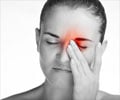A new therapy that uses magnetic pulses has shown promise in treating chronic migraine sufferers, say researchers.
A new therapy that uses magnetic pulses has shown promise in treating chronic migraine sufferers, say researchers.
The new therapy is called transcranial magnetic stimulation, or TMS.During the study conducted in rats, the University of California, San Francisco researchers focused on understanding the mechanism of action of TMS therapy, how the treatment interacted with the brain to produce the pain-free outcomes of patients.
They identified potential opportunities to enhance treatment strategies in patients.
The study team noted that factors such as time and peak intensity of stimulation may be important components in the brain's response to TMS.
"The data demonstrate a biological rationale for the use of TMS to treat migraine aura," said Peter Goadsby, lead investigator of the study, professor and director of the UCSF Headache Centre.
"We found that cortical spreading depression, known as CSD and the animal correlate of migraine aura, was susceptible to TMS therapy, with the wave of neuronal excitation blocked on over 50 percent of occasions," he added.
Advertisement
The magnetic pulses block the wave of neuronal excitation, which is a biological system through which neurons become stimulated to fire.
Advertisement
The researchers hope that the findings give neurologists a potential new treatment option for migraine sufferers unable to tolerate medication.
The findings were presented during the annual American Academy of Neurology scientific meeting in Seattle.
Source-ANI
SRM













